蜘蛛侠英语演讲(课堂PPT)
- 格式:ppt
- 大小:11.84 MB
- 文档页数:23
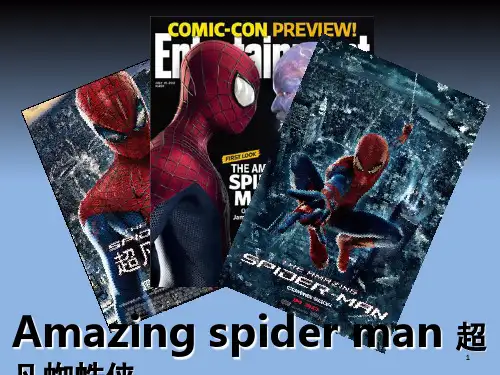

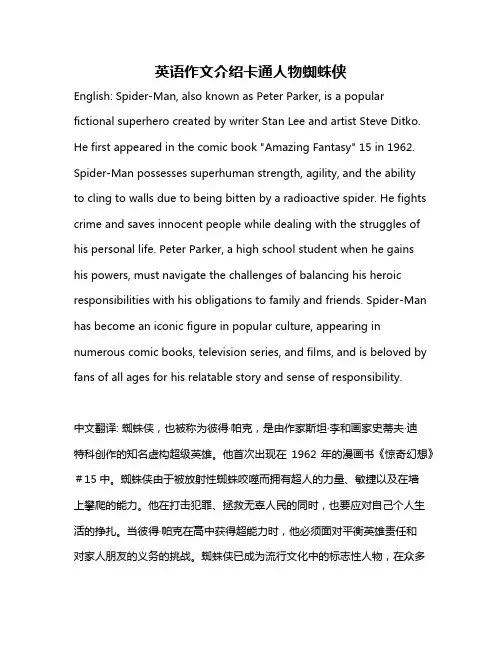
英语作文介绍卡通人物蜘蛛侠English: Spider-Man, also known as Peter Parker, is a popular fictional superhero created by writer Stan Lee and artist Steve Ditko. He first appeared in the comic book "Amazing Fantasy" 15 in 1962. Spider-Man possesses superhuman strength, agility, and the abilityto cling to walls due to being bitten by a radioactive spider. He fights crime and saves innocent people while dealing with the struggles of his personal life. Peter Parker, a high school student when he gains his powers, must navigate the challenges of balancing his heroic responsibilities with his obligations to family and friends. Spider-Man has become an iconic figure in popular culture, appearing in numerous comic books, television series, and films, and is beloved by fans of all ages for his relatable story and sense of responsibility.中文翻译: 蜘蛛侠,也被称为彼得·帕克,是由作家斯坦·李和画家史蒂夫·迪特科创作的知名虚构超级英雄。
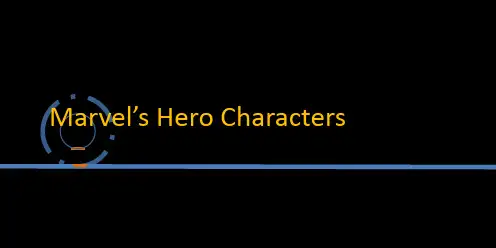
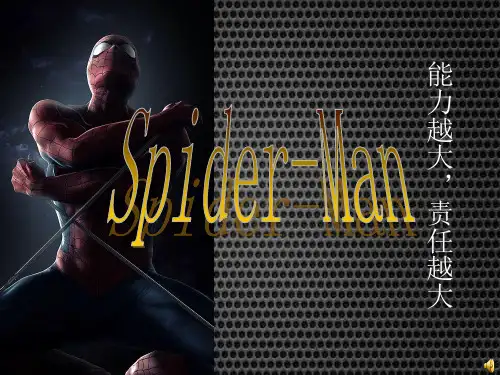

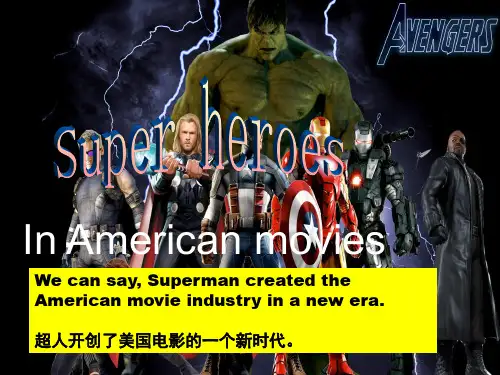
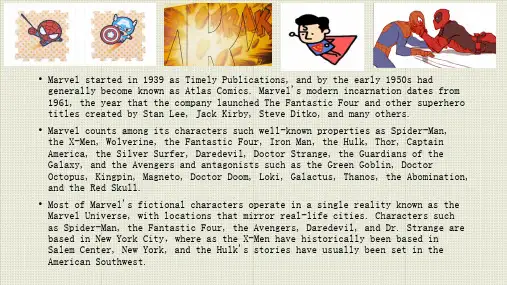
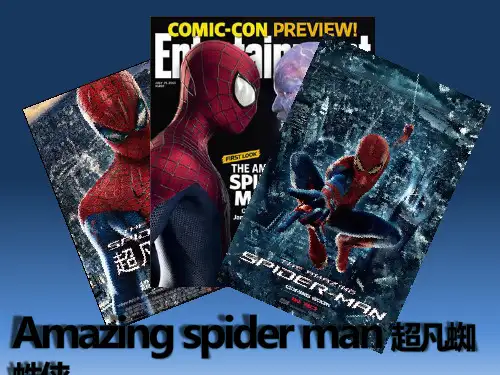
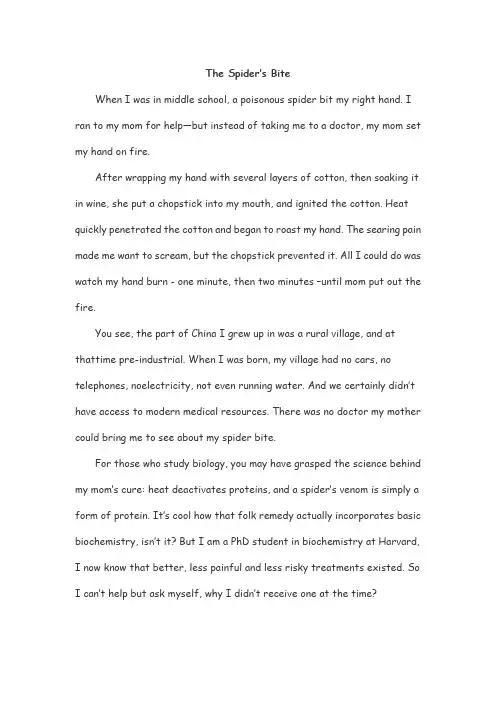
The Spider’s BiteWhen I was in middle school, a poisonous spider bit my right hand. I ran to my mom for help—but instead of taking me to a doctor, my mom set my hand on fire.After wrapping my hand with several layers of cotton, then soaking it in wine, she put a chopstick into my mouth, and ignited the cotton. Heat quickly penetrated the cotton and began to roast my hand. The searing pain made me want to scream, but the chopstick prevented it. All I could do was watch my hand burn - one minute, then two minutes –until mom put out the fire.You see, the part of China I grew up in was a rural village, and at thattime pre-industrial. When I was born, my village had no cars, no telephones, noelectricity, not even running water. And we certainly didn’t have access to modern medical resources. There was no doctor my mother could bring me to see about my spider bite.For those who study biology, you may have grasped the science behind my mom’s cure: heat deactivates proteins, and a spider’s venom is sim ply a form of protein. It’s cool how that folk remedy actually incorporates basic biochemistry, isn’t it? But I am a PhD student in biochemistry at Harvard, I now know that better, less painful and less risky treatments existed. So I can’t help but ask myself, why I didn’t receive one at the time?Fifteen years have passed since that incident. I am happy to report that my hand is fine. But this question lingers, and I continue to be troubled by the unequal distribution of scientific knowledge throughout the world. We have learned to edit the human genome and unlock many secrets of how cancer progresses. We can manipulate neuronal activity literally with the switch of alight. Each year brings more advances in biomedical research-exciting, transformative accomplishments. Yet, despite the knowledge we have amassed, we haven’t been so successful in deploying it to where it’s needed most. According to the World Bank, twelve percent of the world’s population lives on less than$2 a day. Malnutrition kills more than 3 million children annually. Three hundred million people are afflicted by malaria globally. All over the world, we constantly see these problems of poverty, illness, and lack of resources impeding the flow of scientific information. Lifesaving knowledge we take for granted in the modern world is often unavailable in these underdeveloped regions. And in far too many places, people are still essentially trying to cure a spider bite with fire.While studying at Harvard, I saw how scientific knowledge can help other sin simple, yet profound ways. The bird flu pandemic in the 2000s looked to my village like a spell cast by demons. Our folk medicine didn’t even have half-measures to offer. What’s more, farmers didn’t know the difference between common cold an d flu; they didn’t understand that theflu was much more lethal than the common cold. Most people were also unaware that the virus could transmit across different species.So when I realized that simple hygiene practices like separating different animal species could contain the spread of the disease, and that I could help make this knowledge available to my village, that was my first ―Aha‖moment as a budding scientist. But it was more than that: it was also a vital inflection point in my own ethical development, my ownself-understanding as a member of the global community.Harvard dares us to dream big, to aspire to change the world. Here on this Commencement Day, we are probably thinking of grand destinations and big adventures that await us. As for me, I am also thinking of the farmers in my village. My experience here reminds me how important it is for researchers to communicate our knowledge to those who need it. Because by using the science we already have, we could probably bring my village and thousands like it into the world you and I take for granted every day. And that’s an impact every one of us can make!But the question is, will we make the effort or not?More than ever before, our society emphasizes science and innovation. But an equally important emphasis should be on distributing the knowledge we have to where it’s needed. Changing the world doesn’t mean that everyone has to find the next big thing. It can be as simple as becoming better communicators, and finding more creative ways to pass on theknowledge we have to people like my mom and the farmers in their local community. Our society also needs to recognize that the equal distribution of knowledge is a pivotal step of human development, and work to bring this into reality.And if we do that, then perhaps a teenager in rural China who is bitten by a spider will not have to burn his hand, but will know to seek a doctor instead.。
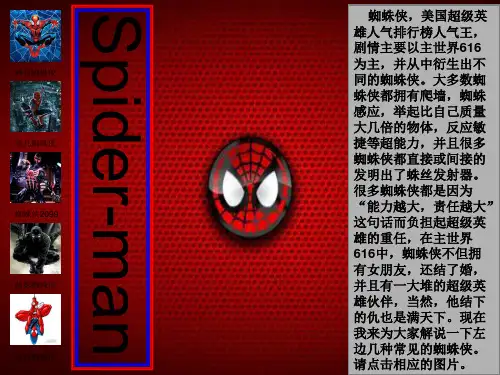
英语作文介绍卡通人物蜘蛛侠英文回答:Spider-Man is one of the most iconic and beloved superheroes in the world. He first appeared in Marvel Comics' Amazing Fantasy #15 in 1962, and has since starredin countless comic books, movies, TV shows, and video games.Spider-Man's alter ego is Peter Parker, a high school student who is bitten by a radioactive spider. This bite gives him superhuman strength, speed, agility, and theability to cling to surfaces. Peter also develops a"spider-sense" that warns him of danger.As Spider-Man, Peter uses his powers to fight crime and protect the innocent. He is a member of the Avengers, and has fought alongside other superheroes such as Iron Man, Captain America, and the Hulk.Spider-Man is a complex and relatable character. He isa teenager who is trying to balance his superhero life with his normal life. He is also dealing with the death of his parents, and the responsibility of being a hero.Spider-Man's popularity is due to his relatable personality and his exciting adventures. He is a symbol of hope and inspiration for people of all ages.中文回答:蜘蛛侠是世界上最具标志性和最受喜爱的超级英雄之一。
TheSpider英文演讲稿The Spider’s BiteWhen I was in middle school, a poisonous spider bit my right hand. I ran to my mom for help—but instead of taking me to a doctor, my mom set my hand on fire.After wrapping my hand with several layers of cotton, then soaking it in wine, she put a chopstick into my mouth, and ignited the cotton. Heat quickly penetrated the cotton and began to roast my hand. The searing pain made me want to scream, but the chopstick prevented it. All I could do was watch my hand burn - one minute, then two minutes –until mom put out the fire.You see, the part of China I grew up in was a rural village, and at thattime pre-industrial. When I was born, my village had no cars, no telephones, noelectricity, not even running water. And we certainly didn’t have access to modern medical resources. There was no doctor my mother could bring me to see about my spider bite.For those who study biology, you may have grasped the science b ehind my mom’s cure: heat deactivates proteins, and a spider’s venom is sim ply a form of protein. It’s cool how that folk remedy actually incorporates basic biochemistry, isn’t it? But I am a PhD student in biochemistry at Harvard, I now know that better, less painful and less risky treatments existed. So I can’t help but ask myself, why I didn’t receive one at the time?Fifteen years have passed since that incident. I am happy to report that my hand is fine. But this question lingers, and I continue to be troubled by the unequal distribution of scientific knowledge throughout the world. We have learned to edit the human genome and unlock many secrets of how cancerprogresses. We can manipulate neuronal activity literally with the switch of alight. Each year brings more advances in biomedical research-exciting, transformative accomplishments. Yet, despite the knowledge we have amassed, we haven’t been so successful in deploying it to where it’s needed most. According to the World Bank, twelve percent of the world’s population lives on less than$2 a day. Malnutrition kills more than 3 million children annually. Three hundred million people are afflicted by malaria globally. All over the world, we constantly see these problems of poverty, illness, and lack of resources impeding the flow of scientific information. Lifesaving knowledge we take for granted in the modern world is often unavailable in these underdeveloped regions. And in far too many places, people are still essentially trying to cure a spider bite with fire.While studying at Harvard, I saw how scientific knowledge can help other sin simple, yet profound ways. The bird flu pandemic in the 2000s looked to my village like a spell cast by demons. Our folk medicine didn’t even have half-measures to offer. What’s more, farmers didn’t know the difference between common cold an d flu; they didn’t understand that the flu was much more lethal than the common cold. Most people were also unaware that the virus could transmit across different species.So when I realized that simple hygiene practices like separating different animal species could contain the spread of the disease, and that I could help make this knowledge available to my village, that was my first ―Aha‖moment as a budding scientist. But it was more than that: it was also a vital inflection point in my own ethical development, my ownself-understanding as a member of the global community.Harvard dares us to dream big, to aspire to change the world. Here on this Commencement Day, we are probably thinking of grand destinations and big adventures that await us. As for me, I am also thinking of the farmers in my village. My experience here reminds me how important it is for researchers to communicate our knowledge to those who need it. Because by using the science we already have, we could probably bring my village and thousands like it into the world you and I take for granted every day. And that’s an impact every one of us can make!But the question is, will we make the effort or not?More than ever before, our society emphasizes science and innovation. But an equally important emphasis should be on distributing the knowledge we have to where it’s needed. Changing the world doesn’t mean that everyone has to find the next big thing. It can be as simple as becoming better communicators, and finding more creative ways to pass on the knowledge we have to people like my mom and the farmers in their local community. Our society also needs to recognize that the equal distribution of knowledge is a pivotal step of human development, and work to bring this into reality.And if we do that, then perhaps a teenager in rural China who is bitten by a spider will not have to burn his hand, but will know to seek a doctor instead.。